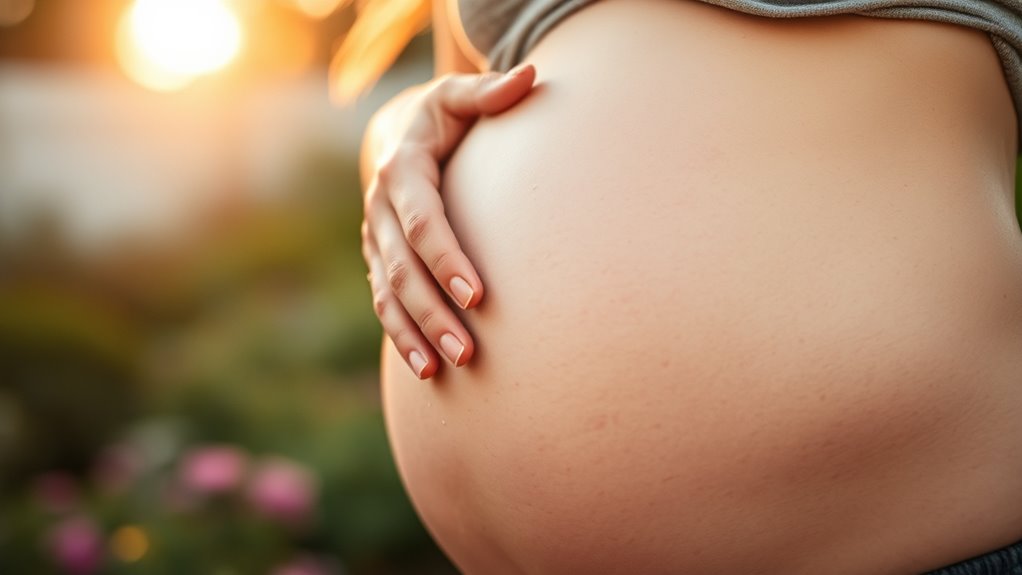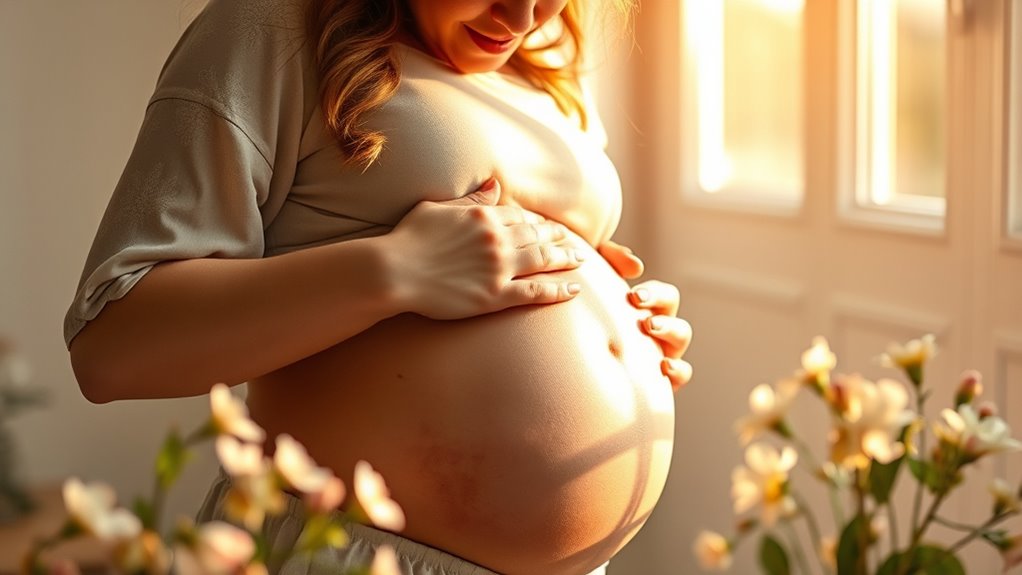Itching during pregnancy is pretty common and can be caused by hormonal changes, skin stretching, and dryness. Your skin becomes more sensitive, which can lead to discomfort, especially in areas like your abdomen. Pre-existing skin conditions may also affect you. If you’re experiencing severe itching, particularly on your hands and feet, it’s important to talk to your healthcare provider, as it could indicate a condition that needs attention. There’s more to know about managing this symptom effectively.
Key Takeaways
- Hormonal changes during pregnancy can increase skin sensitivity and lead to itching.
- Skin stretching, particularly on the abdomen, contributes to discomfort and itchiness.
- Dry skin from fluctuating hydration levels often exacerbates itching sensations.
- Pre-existing skin conditions, like eczema, may worsen or improve during pregnancy.
- Intrahepatic cholestasis of pregnancy (ICP) causes severe itching, especially on hands and feet, requiring medical attention.

Pregnancy can bring about many changes, and one common issue you might experience is itching. This sensation often arises from various factors, with hormonal changes being a significant contributor. As your body adapts to the growing baby, fluctuating hormones can lead to increased skin sensitivity, resulting in mild to moderate itching. You may notice this sensation particularly on your abdomen, where the skin stretches to accommodate your expanding belly.
Itching during pregnancy often stems from hormonal changes, leading to increased skin sensitivity and discomfort, especially on the abdomen.
Dry skin is another common culprit. As your body undergoes these transformations, hydration levels can fluctuate, leading to dryness that exacerbates itching. It’s essential to stay well-hydrated and nourish your skin to help alleviate this discomfort. You might also find that pre-existing skin conditions like eczema can either worsen or improve during pregnancy. If you have a history of eczema, keep an eye on any changes in your symptoms.
While mild itching is usually harmless, you should be vigilant for signs of more severe conditions. Intrahepatic cholestasis of pregnancy (ICP) is one such condition that can cause intense itching, particularly on your hands and feet. This occurs when bile salts build up in your bloodstream, leading to a persistent urge to scratch. If you experience severe itching without a rash, especially if it worsens at night, consult your healthcare provider. Other symptoms like dark urine or pale stools could indicate cholestasis and warrant immediate attention.
Managing itching during pregnancy includes simple lifestyle changes. Wearing loose, cotton clothing can help reduce irritation, while cool or lukewarm baths can soothe your skin. Applying unperfumed moisturizers after bathing will keep your skin hydrated and may alleviate some itchiness.
If dietary adjustments are on your radar, consider avoiding spicy foods and caffeine, as they can sometimes exacerbate itching.
In some cases, itching during pregnancy can signal underlying conditions that need monitoring. Polymorphic eruption of pregnancy (PEP) is one example, causing itching accompanied by a rash. Though psoriasis symptoms often improve, cholestasis is a serious concern that requires close monitoring.
If diagnosed with cholestasis, your healthcare provider may recommend blood tests and medication to manage bile acid levels. Early delivery might even be necessary to prevent complications like preterm birth or stillbirth.
Frequently Asked Questions
Can Pregnancy Itching Indicate an Underlying Health Issue?
Yes, pregnancy itching can indicate an underlying health issue.
If you experience severe itching, especially on your palms and soles, it’s important to pay attention. This could signal conditions like cholestasis of pregnancy.
Other symptoms, such as jaundice or dark urine, may also arise. If you notice these signs, don’t hesitate to seek medical advice.
It’s essential to monitor any unusual changes during this time for your health and your baby’s well-being.
Are There Specific Home Remedies for Pregnancy Itching?
You can try several home remedies to ease itching. Oatmeal baths soothe inflammation, while coconut oil moisturizes and calms your skin.
Lemon juice can balance skin pH, and a besan flour paste offers instant relief. Regularly moisturizing, staying hydrated, and taking cooler showers can help too.
For immediate relief, consider cold compresses or calamine lotion. Just remember to avoid scratching to prevent further irritation and keep your skin comfortable.
How Can I Prevent Pregnancy Itching From Occurring?
To prevent itching, keep your body cool and moisturize regularly with natural ingredients.
Avoid heat by taking short, cooler showers and wearing loose, breathable clothing.
Try using cooling sprays with soothing ingredients.
Incorporate oatmeal baths for relief and consider using gentle, fragrance-free cleansers.
Additionally, using unscented laundry detergents can help reduce irritation.
If the itching persists, consult a doctor to rule out any underlying conditions or to explore treatment options.
Is Pregnancy Itching More Common in Certain Trimesters?
Yes, you’ll find that pregnancy itching is more common in certain trimesters.
In the first trimester, it’s less frequent but can still happen.
As you move into the second trimester, conditions like prurigo of pregnancy may emerge.
By the third trimester, itching often increases due to skin stretching and other factors.
Staying aware of these changes can help you manage any discomfort you experience during your pregnancy journey.
When Should I Consult a Doctor About Pregnancy Itching?
If you’re experiencing persistent or worsening itching, it’s time to consult a doctor.
Pay attention if the itching is severe, especially on your palms and soles, or if it occurs without a rash, particularly at night.
Symptoms like dark urine, pale stools, or yellowing skin and eyes should also prompt immediate medical attention.
Additionally, any rash or bumps could indicate other conditions that need evaluation.
Don’t hesitate to seek help.
Conclusion
In the grand tapestry of pregnancy, itching can feel like an unwelcome thread, pulling at your comfort. But understanding its origins can turn that irritation into a mere whisper in the background. By nurturing your skin and staying hydrated, you can weave a soothing balm over the discomfort. Embrace this journey, and remember that each sensation is part of the beautiful symphony of creating life. Soon, the sweet lullaby of your baby’s arrival will drown out the itch.









